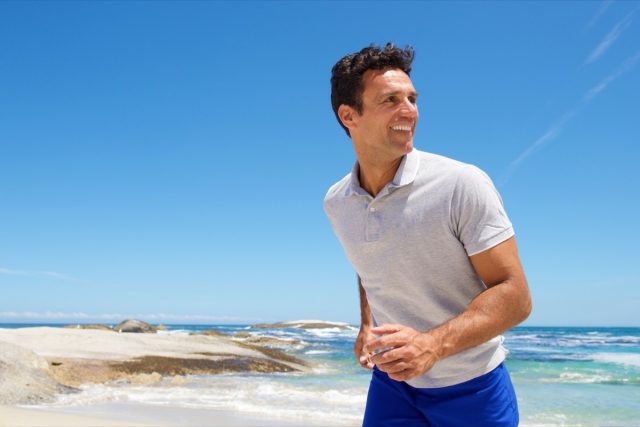The One Habit an Oncologist Recommends Everyone Add by Age 40

As you age, tuning into your body becomes more important than ever. Research shows that cancer rates steadily increase with age—from fewer than 26 cases per 100,000 individuals under 20, to roughly 350 per 100,000 people aged 45 to 49, to over 1,000 per 100,000 in individuals 60 and over. That’s why incorporating healthy habits into your lifestyle is not a question—it’s an essential. We chatted with an oncologist who shares the #1 habit to adopt by age 40 to help lower your cancer risk.
An Oncologist’s #1 Habit To Adopt by Age 40 To Reduce Cancer Risk

Daily movement can work wonders for your mind, body, and soul, but ensuring it’s serving its core purpose is critical. That means blending together two key forms of exercise: cardio and strength training.
“By age 40, I recommend adopting structured daily physical activity that integrates both aerobic and resistance-based exercise,” says Christopher R. Cogle, M.D., a board-certified oncologist, Board Member at Complement 1, and professor at University of Florida in the MD-HEMATOLOGY/ONCOLOGY department. “This could be as simple as 30 minutes of walking most days a week. Epidemiological data consistently link regular physical activity to lower incidence of multiple cancers, including breast, colorectal, endometrial, and prostate cancers.”
In addition, exercise decreases chronic low-grade inflammation, improves insulin sensitivity, and boosts immune surveillance through improved natural killer (NK) cell activity—all of which are associated with cancer development, Dr. Cogle adds.
Age 40 Is a Crucial Turning Point for Long-Term Disease Prevention

Turning 40 means transitioning into middle adulthood.
“[This stage of life is] when biological aging processes, such as genomic instability, mitochondrial dysfunction, and immunosenescence, begin to accelerate,” Dr. Cogle tells us. “This is also when the cumulative effects of subclinical metabolic dysfunction, environmental exposures, and lifestyle behaviors start to manifest in measurable physiologic decline. Early intervention at this stage can alter the arc of these processes.”
Optimizing Your Lifestyle With Healthy Habits

Implementing healthy habits shouldn’t stop at your workout routine. Lifestyle factors such as diet, alcohol usage, and sleep should be addressed as well.
“These factors modulate key biological pathways that either promote or inhibit carcinogenesis,” Dr. Cogle explains. “For example, diets high in processed foods, added sugars, and saturated fats promote insulin resistance and oxidative stress. Conversely, diets rich in fiber, phytonutrients, and healthy fats (such as those in a plant-forward diet) reduce systemic inflammation and improve gut microbiome diversity, which is linked to immune health and cancer prevention.”
Dr. Cogle specifically recommends consuming a plant-forward diet that’s rich in omega-3 fatty acids, fiber, antioxidants, and polyphenols.
In addition, you may want to limit alcohol consumption, as it can disrupt hormones and increase your risk of certain cancers.
Be sure your bedtime routine is primed for a solid night’s rest, as chronic sleep issues mess with the circadian regulation of cell division and DNA repair, heightening your cancer risk. Ensure your sleep space is cool and dark and you limit blue light usage before hitting the sheets.